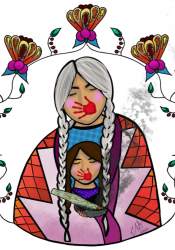The Murder of Sereena Abotsway
Sereena Abotsway was 29 years old when she disappeared in August of 2001. She was reported missing by her foster mother on August 22, 2001. Sereena’s murderer, Robert Pickton, was caught much later. Abotsway was one of six women “whom Port Coquitlam pig farmer Robert Pickton” has been accused of killing. Pickton was a serial killer who usually targetted sex workers, and many of the sex workers in Pickton’s nearby community in Vancouver were Indigenous. This demonstrates a larger social issue of Indigenous people having fewer socioeconomic opportunities than their other racial counterparts, therefore turning to work such as sex work. Sex work has connotations of dirtiness, shame, and unethicalness; meaning that when issues occur to those who do sex work, people tend to be less sympathetic. The facts of her work and drug addiction illustrated the media’s tendency to show Indigenous peoples in a negative light. Abotsway’s work and life choices were used to help dehumanize her and feed social stereotypes about Indigenous women despite her being a victim. This can also be seen in news headlines regarding her murder, such as the article in the Vancouver Sun titled “Sereena Abotsway: A troubled child who once won a trip to Holland eventually wound up on the streets of Vancouver.” Headlines such as this one makes the victim sound like the problem and the issues they face as due to their own life choices, while the positive aspects of their life were due to outside factors. Additionally, “Some friends and relatives of the victims complain that police didn’t respond quickly enough to missing person reports because most of the women supported their drug habits with prostitution. And now the families hope positive memories about the women can rise above the troubling evidence that is expected to emerge from Pickton’s first trial.”
Sereena’s brother wrote that “Sereena did not choose to live life the way she did, circumstances chose it for her.” He continues later by stating that “Sereena quite often, when talking to us on the phone, would ask us to make sure that the younger [foster] children would never end up living the life that she was living.” Furthermore, Abotsway’s missing and murdered case took place in 2001, a year before the Native Women’s Association, Amnesty International Canada, KAIROS, Elizabeth Fry Society, the United Church, and the Anglican Church came together to form the “National Coalition for our Stolen Sisters.” Since this historical movement first formed, cases of discrimination against Indigenous women countinue to be incredibly high even among other women in racial minoirities.
Sources:
Culbert, Lori. “Sereena Abotsway: A Troubled Child Who Once Won a Trip to Holland Eventually Wound up on the Streets of Vancouver.” Vancouver Sun, Vancouver Sun, 19 May 2017, vancouversun.com/news/local-news/sereena-abotsway-a-troubled-child-who-once-won-a-trip-to-holland-eventually-wound-up-on-the-streets-of-vancouver.
Miller-Tanner, Makoons. “Sereena Abotsway, Murdered by Serial Killer in British Columbia in 2001.” Justice for Native Women, Dec. 2018, www.justicefornativewomen.com/2018/12/sereena-abotsway-murdered-by-seria....
“Timeline.” KAIROS Canada, 2020, www.kairoscanada.org/missing-murdered-indigenous-women-girls/inquiry-tim....

